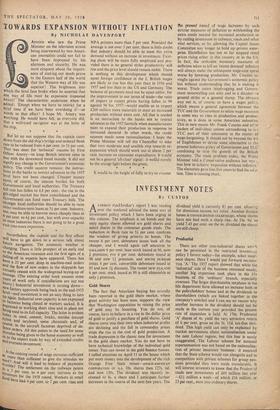INVESTMENT NOTES
By CUSTOS ALONDON stockbroker's report I was reading over the weekend advised the same sort of investment policy which I have been urging in this column. The emphasis is on bonds and the only equity shares allowed are gold shares and select shares in the consumer goods trade. The reduction in Bank rate to 5-1 per cent. confirms the wisdom of giving priority to bonds. The recent 6 per cent. debenture issues look all the cheaper, and I would again call attention to GALLAHER 6 per cent. loan stock issued at 96, now premium, PYE 6 per cent. debenture issued at 98 and now premium, and scum DURHAM STEEL 6 per cent. convertible debenture issued at 95 and now 31 discount. The recent NEW ZEALAND 6 per cent. stock issued at 99 is still obtainable at only premium.
Gold Shares The fact that American buying has actually been reported in the gold share market, where great activity has been -seen, supports the view that Washington opposition to raising the price of gold may be lessening. You do not, of course, have to believe in a rise in the dollar price of gold to justify a purchase of gold shares. Gold shares come into their own when industrial profits are declining and the fall in commodity prices stops the rise in the cost of gold production. A trade depression is the classic time for investment in the gold share market. You do not have to have technical knowledge of the individual gold mines. You can invest in the gold finance houses. I called attention on April 11 to the house which put most money into the development of the rich Orange Free State mines—ANGLO-AMERICAN CORPORATION OF S.A. lOs. shares then 127s. 6d. and now 139s. The dividend was recently in- creased to 8s. a share and I anticipate further increases in the course of the next few years. The dividend yield is currently 81 per cent. allowing for dominion income tax relief. Another finance house iS CONSOLIDATED GOLDFIELI?S, whose shares have not had such a sharp rise. At 53s. 9d. to yield 7.45 per cent. on the 4s. dividend the shares are still cheap.
Prudential There are other non-industrial shares whi,-h can be permitted in the restricted investm,2,1t policy I favour today—for example, select insur- ance shares. Here I would put forward PRUDEN- TIAL 'A.' The 1957 report showed that while the 'industrial' side of the business remained steady, another big expansion took place in the life business of the 'ordinary' branch, especially overseas. The larger distributable surpluses in the life department have allowed an increase both in the policyholders' bonus and in the dividends to shareholders (which are linked together in the company's articles) and I can see no reason why another increase in the dividend should not be made in the current year provided the present rate of expansion is held. At 170s. Prudential 'A' shares of 4s. yield the very attractive return of 6 per cent. gross on the 5s. I ld. tax-free divi- dend. This high yield can only be explained by market nervousness about nationalisation under the next Labour regime, but this fear is surely exaggerated. The Labour scheme for national superannuation was not based on the nationalisa- tion of private insurance business: it assumed that the State scheme would run alongside and in competition with private schemes for group pen- sions provided they were made transferable. It will interest investors to know that the Prudential made new investments of £69 million last year —LI+ million a week—of which £16 million, or 23 per cent., went into ordinary shares.












































 Previous page
Previous page